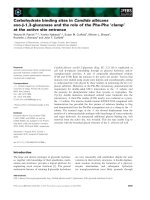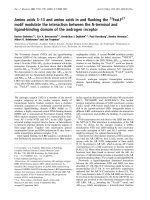Editted topic 3 sexism and gender neutral language
Bạn đang xem bản rút gọn của tài liệu. Xem và tải ngay bản đầy đủ của tài liệu tại đây (44.2 KB, 4 trang )
DEFINITION OF SEXISM
About sexism
Prejudice or discrimination based on one's sex or gender is known as
sexism. Sexism can affect anyone, but women and girls are the ones who are
most affected. It's been linked to gender roles and stereotypes, including the
belief that one sex or gender is intrinsically superior to another.
Sexist language
The English language is not inherently sexist in terms of its linguistic
system, but the way it is operated becomes sexist, and gender-neutral words
could thus be employed.
Gender-specific pejorative terms
Gender-specific pejorative words are used to intimidate or harm
someone because of their gender. Sexism can manifest itself in language that
has negative gender connotations, such as condescension. For example,
instead of referring to a female as a "woman," one might refer to her as a
"girl," implying that she is a subordinate or not fully mature. Obscene
language is another example. Some words, such as "tranny," "she-male," and
"he-she," are offensive to transgender people. The pronoun "it" and
intentional misgendering (assigning the wrong gender to someone) are also
considered derogatory.
Gender-neutral language
Gender-neutral language or gender-inclusive language is the language
that avoids bias towards a particular sex or social gender. In English, this
includes using nouns that are not gender-specific to refer to roles or
professions, forming phrases in a coequal manner, and discontinuing the
blanket use of male terms.
SOME INSTANCES OF SEXISM
Sexist words
‘Without teachers, there are no doctors, policemen, businessmen and
engineers. They create policemen who are in charge of protecting the people,
doctors who tirelessly work to save lives, firemen who keep our houses firefree, engineers and carpenters who make sure our houses are well-built, and
businessmen who supply goods and services in the market. A teacher is a
repairman of a classroom. They cannot be too expressive of their emotions in
the public like dance in the disco bar, kiss their dates in the park, or shout at
that annoying waiter in the restaurant.'
The reasons they are sexist
All these words: Policeman, businessman(businessmen), policemen,
firemen and repairman are sexist. Because not only men are in charge of
crime-imprisoning, fire-distinguishing and or enterprise-managing, but
women also take these responsibilities, and some even get more success than
men do. According to Forbe.com, studies show women-run companies
provide up to a 31% higher rate of return than those run by men.
Using gender-fair and inclusive language also helps reduce gender
stereotyping, promotes social change and contributes to achieving gender
equality.
Some gender-neutral words to replace
When common usage implies outdated stereotypes about occupational
or social sex roles, more specific language can eliminate the stereotypes.
Number
Sexist words
Non-sexist replacements
1
Policemen
Police officers
2
Businessmen
Business executive, entrepreneur
3
Firemen
Firefighters
4
Repairman
Repair person, technician,
mechanic
REFERENCE
1. Autumn
Sandeen(2013)
Anti-transgender
Language
Commentary: Trans Progressive. Wayback Machine San Diego.
2. Fowler, H.W. (2015). Butterfield, Jeremy (ed.). Fowler's
Dictionary of Modern English Usage. Oxford University Press.
3. Mille, Katherine Wyly and Paul McIlvenny.(2013) "Gender and
Spoken Interaction: Surveys of Feminist Theories and Sociolinguistic
Research in the UK and UK.
4. Nakdimen, K. A. (1984). "The Physiognomic Basis of Sexual
Stereotyping". American Journal of Psychiatry.


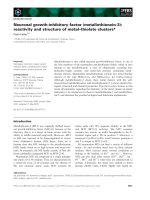
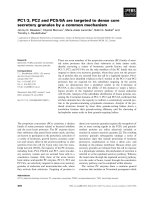

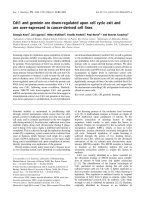
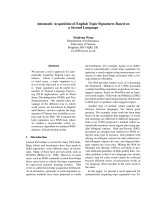
![Báo cáo khoa học: Characterization of glycosphingolipids fromSchistosoma mansoni eggs carrying Fuc(a1±3)GalNAc-, GalNAc(b1±4)[Fuc(a1±3)]GlcNAc-and Gal(b1±4)[Fuc(a1±3)]GlcNAc- (Lewis X) terminal structures pot](https://media.store123doc.com/images/document/14/rc/we/medium_xArMK8DHkQ.jpg)
